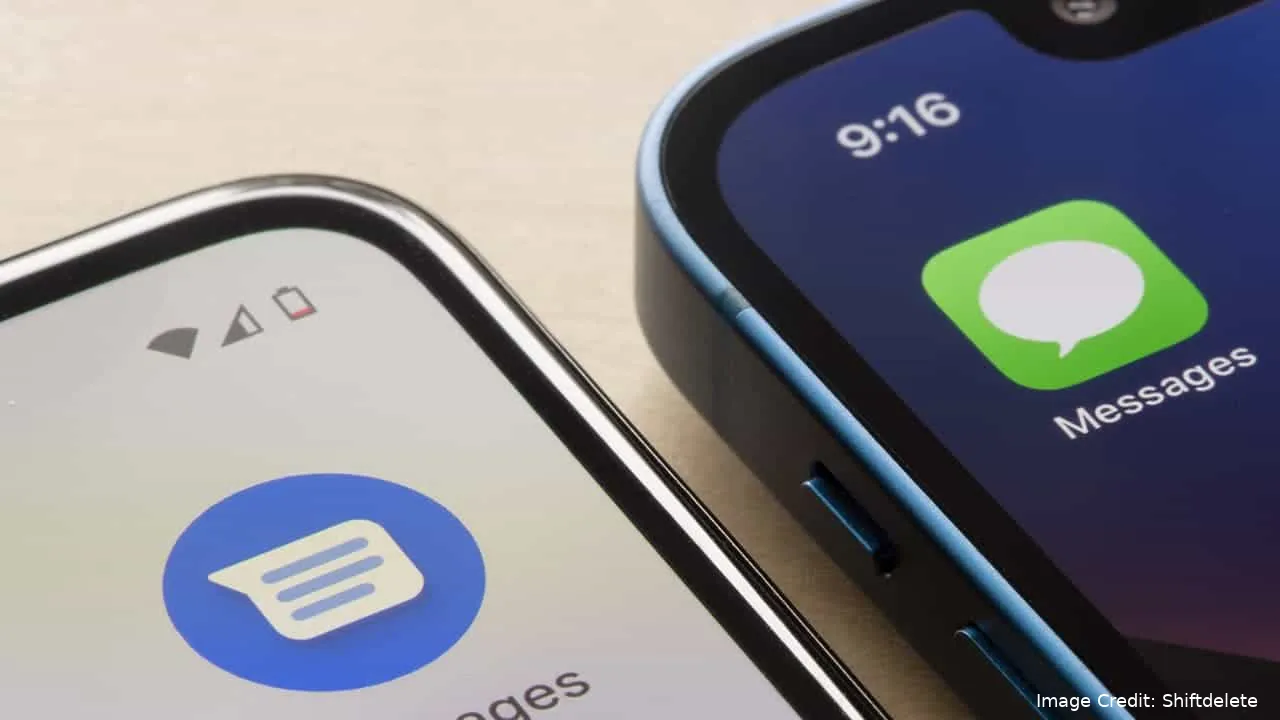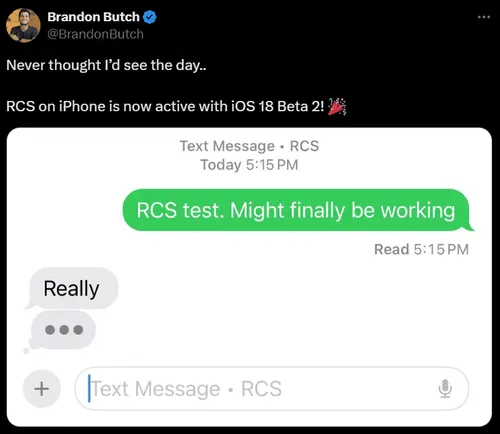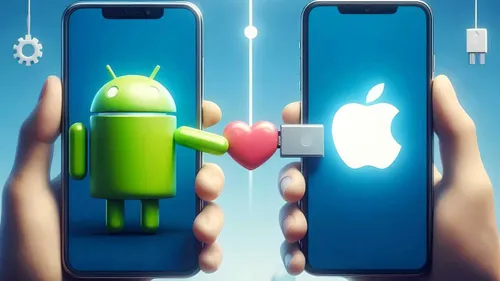
In a move that signifies a potential shift in mobile communication, Apple has begun rolling out Rich Communication Services (RCS) messaging support with the closed beta of iOS 18. This development marks a long-awaited integration for iPhone users, allowing them to exchange messages with Android users on par with features offered by third-party applications like WhatsApp and Telegram.
Bridging the Gap: Apple Embraces RCS Messaging in iOS 18
The Rise of RCS and its Advantages
Prior to Apple's adoption, RCS, introduced by Google in 2019, aimed to revolutionize the standard SMS experience. Classic SMS messaging often falls short in terms of functionality, restricting users to sending text-based messages with limited file size capabilities. RCS promises a more robust messaging experience, offering users several advantages:
- Enhanced Media Sharing: High-resolution photos and videos can be exchanged without compromising quality, a significant improvement over the limitations of traditional SMS.
- Voice Messaging: Users gain the ability to send voice messages, a feature increasingly popular in today's communication landscape.
- Group Chatting: Similar to popular messaging apps, RCS allows for communication with larger groups of users, facilitating seamless interaction within larger circles.
- Read Receipts and Typing Indicators: These features provide real-time communication cues, similar to what users experience with third-party apps.
Apple's Previous Stance on RCS
Apple has historically maintained a closed ecosystem with its iMessage service, favoring communication between iOS devices. This approach left iPhone users with a less feature-rich experience when communicating with Android users, who often relied on SMS or third-party apps. This disparity in functionality created frustration for users who desired a more unified messaging experience across platforms.

The Turning Point: Apple Embraces RCS
The inclusion of RCS support in the iOS 18 beta signifies a potential turning point in Apple's approach to mobile communication. While the feature is currently limited to a closed beta and specific carriers in the US (AT&T, T-Mobile, Verizon), it suggests a potential future where iPhone users can enjoy a more feature-rich and unified messaging experience, regardless of the recipient's device.
Early User Reports and the Road Ahead
Initial reports from users participating in the iOS 18 beta highlight the benefits of RCS. Users report successful exchanges of high-resolution photos and videos with Android users, suggesting the functionality lives up to its promises. However, it's important to note that the feature is still under development and may not be available to all users immediately.
The global rollout of RCS support will depend on collaboration between Apple and mobile carriers worldwide. Furthermore, questions regarding potential end-to-end encryption offered by RCS within the iOS ecosystem remain unanswered. While features like read receipts and typing indicators provide convenience, the level of user privacy offered by RCS on iOS compared to third-party applications requires further clarification from Apple.
The Future of Mobile Communication: A More Unified Landscape?
With Apple's embrace of RCS, the mobile communication landscape could be on the cusp of significant change. Users on both iOS and Android platforms may finally have access to a more standardized and feature-rich messaging experience. This development could potentially lead to a decline in reliance on third-party messaging applications, particularly for basic communication needs.
However, questions regarding the long-term impact on the dominance of iMessage and the future of data privacy within the RCS framework remain. Whether Apple will implement end-to-end encryption on par with third-party applications is a key factor that could influence user adoption.
Looking Forward: A New Era of Communication
The inclusion of RCS messaging support in iOS 18 represents a significant step towards a more unified mobile communication landscape. While the feature is still under development and its global rollout is uncertain, it signifies a potential shift in Apple's approach, offering users a more feature-rich experience when communicating across platforms. As the technology matures and Apple clarifies its stance on data privacy within RCS, we can expect a more comprehensive picture of how this development will shape the future of mobile communication.
The Nuances of RCS: User Privacy, Third-Party Apps, and the Road to Global Adoption
While the introduction of RCS messaging in iOS 18 marks a promising step, several key aspects require further exploration to understand its long-term implications. Here, we delve deeper into the potential impact on user privacy, the future of third-party messaging apps, and the challenges associated with global adoption.

Image Credit: Shiftdelete
User Privacy and the Encryption Debate:
One of the most pressing concerns surrounding RCS is the level of user privacy it offers. Traditionally, SMS messages lack end-to-end encryption, leaving them vulnerable to potential interception. While RCS can support end-to-end encryption, its implementation depends on carrier infrastructure and user configuration. Apple has yet to clarify its stance on whether it will offer end-to-end encryption for RCS messages within the iOS ecosystem.
The lack of guaranteed end-to-end encryption could deter privacy-conscious users who favor applications like Signal or Telegram, which prioritize robust encryption protocols. Furthermore, the potential involvement of carriers in message routing raises concerns about potential data collection practices. Transparency from Apple regarding data handling within the RCS framework and its commitment to user privacy will be crucial in gaining user trust.
The Fate of Third-Party Messaging Apps:
The rise of RCS could potentially lead to a decline in reliance on third-party messaging applications. Features like group chat, read receipts, and high-quality media sharing, previously offered primarily by these apps, are now potentially accessible through native messaging on both iOS and Android devices.
However, the dominance of established platforms like WhatsApp and Telegram may not be immediately threatened. These applications offer additional functionalities beyond basic messaging, such as video calls, disappearing messages, and integrations with other services. Additionally, the ingrained user base and established social networks within these platforms may prevent a significant shift in user behavior overnight.
RCS might carve out a niche within the mobile communication landscape. Serving as a standardized messaging option for basic communication needs across platforms. Third-party applications could then focus on differentiating themselves through innovative features and a continued emphasis on robust data security measures.
Challenges of Global Adoption:
While the initial rollout of RCS support in iOS 18 focuses on specific US carriers. Achieving global functionality presents several challenges. The successful adoption of RCS hinges on collaboration between Apple, mobile carriers worldwide, and potentially even device manufacturers.
Carriers need to invest in upgrading their infrastructure to support the technical requirements of RCS. Additionally, international regulations regarding data privacy and message routing may need to be addressed to ensure seamless functionality across borders. The lack of a unified global standard for RCS implementation could create regional inconsistencies and hinder its widespread adoption.
Conclusion: A Promising Step, but More Questions Remain
Apple's inclusion of RCS messaging in iOS 18 signifies a potentially significant shift in mobile communication. New messaging on iPhone? Not quite here yet. Needs privacy fixes, app fights, and worldwide rollout. But it hints at a future where iPhones and Androids chat better together.
RCS success hinges on 3 things: Apple's privacy approach, industry teamwork, and user adoption. As these get sorted, we'll see how RCS affects how we connect on phones.
Popular News
Latest News
Loading



